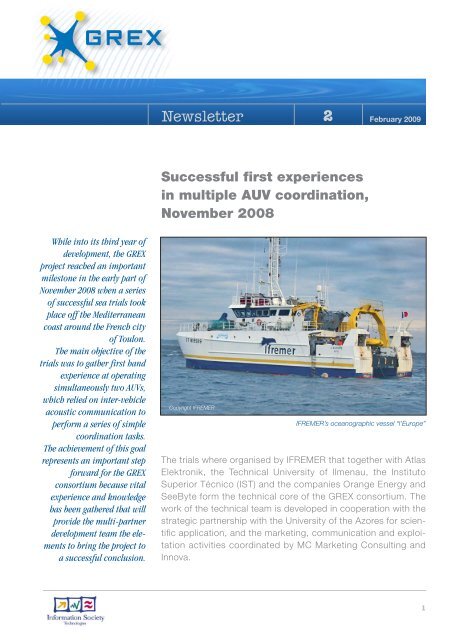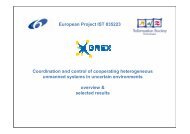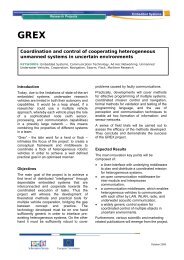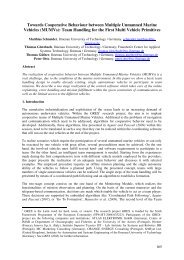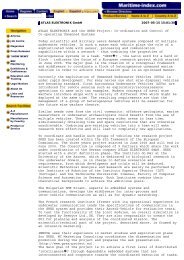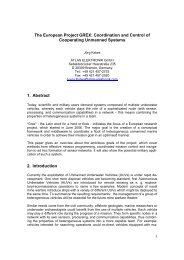2 Newsletter - Grex Project
2 Newsletter - Grex Project
2 Newsletter - Grex Project
Create successful ePaper yourself
Turn your PDF publications into a flip-book with our unique Google optimized e-Paper software.
<strong>Newsletter</strong><br />
2 February 2009<br />
Successful first experiences<br />
in multiple AUV coordination,<br />
November 2008<br />
While into its third year of<br />
development, the GREX<br />
project reached an important<br />
milestone in the early part of<br />
November 2008 when a series<br />
of successful sea trials took<br />
place off the Mediterranean<br />
coast around the French city<br />
of Toulon.<br />
The main objective of the<br />
trials was to gather first hand<br />
experience at operating<br />
simultaneously two AUVs,<br />
which relied on inter-vehicle<br />
acoustic communication to<br />
perform a series of simple<br />
coordination tasks.<br />
The achievement of this goal<br />
represents an important step<br />
forward for the GREX<br />
consortium because vital<br />
experience and knowledge<br />
has been gathered that will<br />
provide the multi-partner<br />
development team the elements<br />
to bring the project to<br />
a successful conclusion.<br />
Copyright IFREMER<br />
IFREMER’s oceanographic vessel “l’Europe”<br />
The trials where organised by IFREMER that together with Atlas<br />
Elektronik, the Technical University of Ilmenau, the Instituto<br />
Superior Técnico (IST) and the companies Orange Energy and<br />
SeeByte form the technical core of the GREX consortium. The<br />
work of the technical team is developed in cooperation with the<br />
strategic partnership with the University of the Azores for scientific<br />
application, and the marketing, communication and exploitation<br />
activities coordinated by MC Marketing Consulting and<br />
Innova.<br />
1
GREX-<strong>Newsletter</strong><br />
2 February 2009<br />
The November trials featured inter-vehicle acoustic communication as the main<br />
focus. In order to gather useful data and experience in realistic condition two<br />
AUVs owned by IFREMER were equipped with the acoustic modem chosen by<br />
the GREX consortium.<br />
AUVortex (left)<br />
and Aster x (right)<br />
the two AUVs that featured<br />
in the 10 days trials<br />
Copyright IFREMER<br />
Copyright IFREMER<br />
For many reasons, the two AUVs used in the tests are very radically different<br />
vehicles. The first is a survey type, 3000 m capable, operational AUV “Aster x ”, a<br />
non hover torpedo shaped vehicle whose typical velocity ranges between 1.2<br />
m/s and 3 m/s.<br />
2
GREX-<strong>Newsletter</strong><br />
2 February 2009<br />
The second vehicle used is the experimental AUV “AUVortex”, a laboratory test<br />
platform developed by IFREMER and specially fitted for the trials. Vortex is a<br />
200 kg hover capable AUV, equipped with 6 thrusters and able to reach a maximum<br />
speed of 0.7 m/s. The vehicle is 50 m max depth rated.<br />
Given the radically different architecture and nature of the vehicles, a series of<br />
operational scenarios have been devised, allowing the two AUVs to perform<br />
some cooperation tasks.<br />
The scenarios all focus on inter-vehicle communication, and feature the computation<br />
of an index of coordination based on the positional data exchanged by the<br />
two vehicles.<br />
As the two AUVs move along their pre-programmed paths, they exchange navigation<br />
data using a preset TDMA (Time Division Medium Access) synchronisation<br />
architecture, allowing the exchange of compressed data packets of about 20<br />
bytes 5 times per minutes and avoiding packet collisions.<br />
The exchanged data is used in both vehicles to compute the index of coordination,<br />
based on considerations on the current distance between the two AUVs.<br />
When a set threshold is overrun, a coordination behaviour is activated.<br />
Copyright IFREMER<br />
The two AUVs at the surface<br />
3
GREX-<strong>Newsletter</strong><br />
2 February 2009<br />
The different scenarios that have been tested involved an increased complexity in<br />
the coordination task. The most comprehensive scenario featured the survey<br />
type AUV starting a series of wait circles at set altitude and communicating the<br />
coordinates of the centre of the circle to the slower AUV.<br />
This allows the trailing vehicle (AUVortex) to reach the given point while the leading<br />
AUV (Aster x ) waited and monitored the distance gap getting reduced.<br />
When confirmation of the completion of the wait task has been acknowledged by<br />
both vehicles, they were automatically released on the original paths.<br />
Copyright IFREMER<br />
Inter-vehicle communication statistics:<br />
bottom-up communication (left)<br />
and top-down (right)<br />
Typical coordination mission<br />
sequence: the green track represents<br />
the trajectory of Aster x , the<br />
leading AUV, performing automatically<br />
wait circles to allow the trailing<br />
AUV (blue track) to reach proximity.<br />
The AUV were programmed to<br />
navigate at different depths to<br />
avoid collision.<br />
Copyright IFREMER<br />
The overall behaviour is fully automatic, as both vehicles are both untethered and<br />
autonomous. The performance of the task relies heavily on the acoustic communication<br />
exchange which is affected by the known issues of reduced bandwidth,<br />
packet loss due to ambient noise, absorption, multipath and doppler effect. For<br />
this reason a specific communication module has been developed to handle<br />
packet exchange and synchronisation. This module will form the core of the GREX<br />
communication handler to be developed in the later stage of the project, that will<br />
extend the capabilities to several vehicles therefore supporting a comprehensive<br />
underwater acoustic communication network (including adaptive network management,<br />
network discovery, message forwarding and retransmission).<br />
4
GREX-<strong>Newsletter</strong><br />
2 February 2009<br />
The success of the GREX trials is further enhanced by the fact that for the first time<br />
two fully autonomous vehicles have been operated by IFREMER from an operational<br />
oceanographic vessel. A further important milestone reached is having two<br />
vehicles communicating automatically among themselves underwater.<br />
For the logistics of the trials the oceanographic vessel “l’Europe” was made available<br />
by IFREMER for the duration of the trials (ten days). The operational AUV<br />
Aster x was taken onboard accompanied by the three men crew necessary for<br />
operating the vehicle.<br />
Further scientists and engineers from the GREX consortium were also onboard for<br />
the duration of the trials both for operating the second AUV, AUVortex, and for<br />
handling the acoustic communication module. A great deal of data has been collected<br />
using the ship’s hydrophones set and ship mounted acoustic modem, allowing<br />
for a deeper analysis of the performance of inter-vehicle communication.<br />
The development team was completed by an ESR (Early Stage Researcher) from<br />
the EC funded Research Training Network FreesubNET, further symbolising the<br />
achieved synergy at European level between different research efforts in this field.<br />
GREX<br />
c/o ATLAS ELEKTRONIK GmbH<br />
Mr. Jörg Kalwa<br />
Sebaldsbrücker Heerstraße 235<br />
D-28309 Bremen/Germany<br />
Email: info@grex-project.eu<br />
www.grex-project.eu<br />
5
GREX-<strong>Newsletter</strong><br />
2 February 2009<br />
Consortium<br />
Atlas Elektronik GmbH, Germany<br />
IMAR-DOP/University of the Azores,<br />
Portugal<br />
Ifremer, France<br />
Technical University of Lisbon - IST/ISR,<br />
Portugal<br />
TU Ilmenau, Germany<br />
SeeByte Ltd., Great Britain<br />
Orange Energy, Portugal<br />
Innova S.p.A, Italy<br />
MC Marketing Consulting, Germany<br />
6


